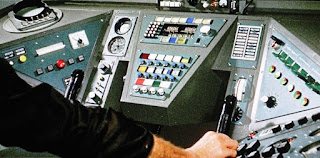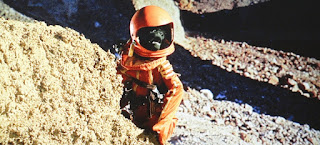I know I've done it. And here's the hairiest problem of all---isolation. Being alone. Boy here's where he'll crack.
Here's where he'll go under.
I know I had great training including two months in the isolation chamber. But when I was in that chamber I knew I was coming out.
I knew I'd be with people again.
But up here on Mars you gotta face the reality of being alone forever!"
-Paul Mantee as Commander Christopher "Kit" Draper-


As of this writing this writer has been immersed in viewing a series of Criterion Collection films including director Byron Haskin's penultimate film as a director Robinson Crusoe On Mars (1964).
Criterion is all about the restoration of films that are perceived as "classic," both young and old films alike. It doesn't necessarily deem those films as mainstream entertainment, but worthy of artistic merit on one level or another. Many films are noteworthy visually, while others for their writing, but not always for their pacing to be sure. Many are often laboriously paced, but to film aficionados they are often a lost treat packed to the gills with extras and/or new features, interviews or documentaries. Review sites like Blu-Ray.com often HIGHLY RECOMMEND these films (including Robinson Crusoe On Mars). This writer appreciates film in all its forms and is given to a discerning eye, but many I've seen can be a slog. While still others are simply glorious to behold again.
And an appearance by Batman's Adam West. And given his now iconic cult status in Batman (1966-1968) part of me would have potentially enjoyed Robinson Crusoe even more had he been the astronaut to survive.

What makes these films classic? Much of it would seem fairly subjective. General audiences might yawn at many of these films, but to the film fan with a critical eye there is much to appreciate in them. Louis Malle's Au Revoir Les Enfants (1987), Sam Peckinpah's Straw Dogs (1971), Lasse Hallstrom's My Life As A Dog (1985), Martin Rosen's Watership Down (1978) and Wim Wenders' Paris, Texas (1984) are among those released by Criterion that deserve a rousing affirmation of approval. Other endorsements are plentiful but some require caution.


As a staunch supporter of all things science fiction would Robinson Crusoe On Mars automatically reserve a spot among those ranks? Robinson Crusoe On Mars has its merits and certainly looks as good as a film of this vintage has any right to, but being a Criterion classic doesn't assure its value as entertainment. Many will miss the point of these films even falling prey to the idea they might all be fun to watch. There is value here to the film, but Robinson Crusoe On Mars is an entirely subjective entertainment, like all film, but one likely with ringing endorsements somewhere in the minority.


Robinson Crusoe On Mars approaches the material based on Daniel Defoe's classic novel, Robinson Crusoe (1719), by applying the spirit of that book to outer space and more specifically, an artistic vision of Mars based on the information available to us in 1964.
Thus, some of the scientific accuracy of the film is certainly in question today and even outright wrong. A partially breathable atmosphere. Water. Oxygen. Elements in the film simply don't ring true today. Science has taught us differently since this seeming time capsule was filmed.


Still the film is beautifully lensed and the spirit of the picture about a Martian-styled castaway, a la Matt Damon, in space as a kind of Robinson Crusoe makes for a worthy concept. It certainly worked for the space family Robinson for three seasons of Irwin Allen's Lost In Space (1965-1968) essentially taking the Robinson Crusoe On Mars concept and the foundational underpinnings of Daniel Dafoe and making a family-driven space show for television to great effect. And of course Lost In Space drew from the shipwrecked Swiss Family Robinson, a book published in 1812, by Johann David Wyss, not pre-dating Defoe's classic, but every bit an inspired and equally influential adventure story that's nothing to sneeze at.


And though the effects here have their shortcomings when viewed by contemporary expectations, the matte work and paintings here, on the other hand, are truly stunning and something to behold particularly in a cinema world saturated with computer technology today. They are simply beautiful.
Robinson Crusoe is not essential science fiction but for fans of film and the genre it's an intriguing exploration and snapshot of a moment in cinema. Some of the extras explore this historical angle of the film.


The film itself largely improves as it traverses its Mars landscape as envisioned by Haskins.
The addition of the monkey, a la Lost In Space's Blip (though not an alien monkey with pointy ears), makes for considerably sweet entertainment. Tom Hanks had his Wilson foil in Castaway (2000). Paul Mantee has his monkey. Science fiction was certainly enamored with the monkey during the era. Lost In Space. Planet Of The Apes and here Robinson Crusoe On Mars all explore the concept of man's evolution from ape and our perception of them.


To the point of Castaway, Robinson Crusoe On Mars reminds us just how good Hanks was in carrying a film on a singular performance. Mantee is good, but he's no Tom Hanks.
In many respects what Robinson Crusoe On Mars achieves for its day is fairly remarkable. Man has certainly come a long way and learned a tremendous amount of information since the film was made about Mars though seemingly still not enough.


Despite its impressive look, Robinson Crusoe never rises above B movie status and its by no means as engaging or impressive as the pacing found in a film like Castaway. So don't expect getting lost on the planet in the same fashion we were lost with Hanks on that island. It's a solid Criterion release, but as entertainment would be low on my science fiction radar. Robinson Crusoe On Mars has unquestionable vision to its credit Blu-Ray.com noting its "retro look", but it lacks the rousing, compelling quality of some of the finest space films on record. However, it does look amazing.
































No comments:
Post a Comment